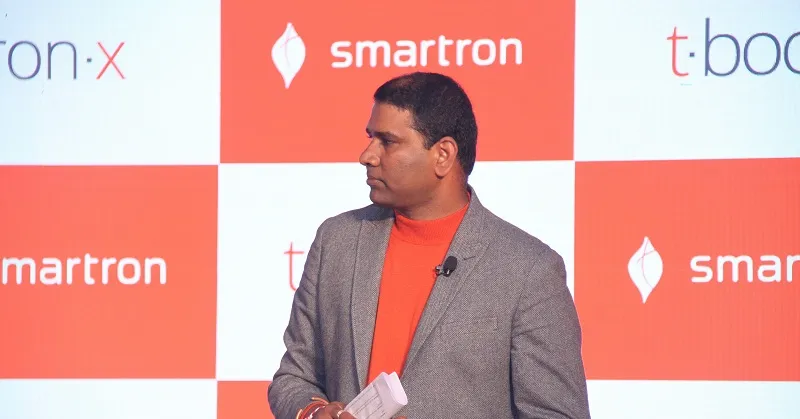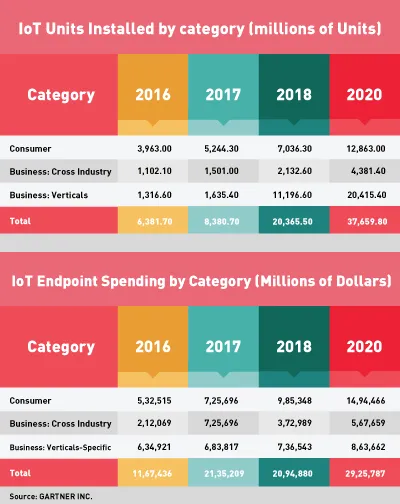Meet Mahesh Lingareddy who convinced Sachin Tendulkar to bet on Smartron, a IoT startup
Gartner Inc. predicts IoT spending across the world to reach $2 trillion in 2017. While it signals the rise of the machines, it also certainly signals the rise of Indian IP through startups like Smartron, which is already a Rs 50-crore business.
There are few who can claim to have built a successful hardware company and to have sold it at a very good price. And there are fewer still who have the courage and conviction to take bets on building products like high-end phones and laptops, designed and engineered in India. This does sound out of the league when everyone else is getting their product designed, engineered and manufactured out of China, slyly tagging on the Make in India label for assembling a few parts in the country.
But that’s not in the nature of Mahesh Lingareddy, the founder of Smartron, because he wants it all in the country of his birth, and he’s playing for big stakes in design and engineering. He believes India's forte is in design and engineering and if nurtured well these could be several times more valuable than China's manufacturing prowess. His business has clocked Rs 50 crore in the 18 months it has been operational, and is now on its way to achieve an ambitious target of Rs 1,300 crore by 2020.

His products, the Smartron Tbook and Tphone, have been selling in the Indian and global markets, thanks to a complete online strategy, In fact, his company claims that the Tbook sells more than Microsoft’s Surface Pro in India. While the IP (design and engineering) is completely Indian, unlike other smartphones, the product is manufactured in China and ships out of Foxconn, Beijing.
The story of Mahesh is one of focus and determination. He is one of those entrepreneurs who is technically skilled, and at the same time, knows what it takes to make a brand or product out of India. These are learnings, he humbly tells YourStory, that he discovered in the Bay Area, which has a very strong ecosystem of academia and corporate support for startups. According to him, it's this “integrated approach” that has made Silicon Valley a formidable innovation hub.
“This is what I have been championing in India for the last three years,” says Mahesh, Chairman of Smartron.
Critics may question whether he is cut out to take on the Indian ecosystem. Mahesh may be a man of few words, but his capital and tenacity speak for him, and seem perfectly poised to help him achieve his dreams.
Before we tell his story, here are some of the mantras that Mahesh shared with YourStory:
- He is constantly upgrading his skills.
- He is networking with people who believe in his vision.
- His bets are nothing short of taking on the conventional wisdom.
- He says he does not give up during adversity, he just builds what he is good at.
- He partners with the right teams and fuses his vision with their ideas.
- He does not wait for government support or any accelerator to make his vision a reality.
The beginning
It all started after Mahesh graduated with an engineering degree from Andhra University in 1997 and followed it up with an MSc from the University of Toledo, in Ohio, US. He then moved to the Bay Area to work for Intel, while at the same time working on several side projects. His knowledge of core engineering brought him into contact with Mohammed Abdallah, a Jordanian, with whom he founded Soft Machines in 2006, which worked on semiconductor IP and built system on chip architectures. The company had raised around $200 million from AMD, and in September 2016, it was sold to Intel. Sources estimate that Soft Machines was sold for a good Rs 2,000 crore.
In August 2014, Mahesh seeded the idea of an Indian hardware company that would make Indian products for the globe with its core value as IP. Says Mahesh,
“We have a lot to learn from China. Twenty years ago, they were the same as us, and now, they have brands in technology that have grown global. There is a need to build an IP company out of India; very few of them exist in India at the moment.”
He adds that while India may not be the best at manufacturing, it has have a fair chance of creating IP for the globe.
Mahesh, like many businessmen, works long hours. He has little free time, which he spends reading biographies. When he is not working with his 200-member team to build new product lines for the company, he is traveling and meeting funds to invest in the India story. He is well known in the Make-in-India circles and is keen on the government creating an ecosystem, from academia to corporates, to encourage the funding of ideas that can generate intellectual property. “We need large grants to build IP, and these are long gestation businesses,” says Mahesh.
While not willing to disclose its investors, Mahesh acknowledges that Smartron has currently invested Rs 100 crore in the business, and will close around Rs 100 crore by the end of the year. Sachin Tendulkar, the inconic ex-cricketer, has invested in this company too. The company offers its own cloud storage to its users, and is building smart routers that can usher in the large-scale adoption of IoT in the country.
“What saddens me is that while there are announcements and funds for innovation in the country, they have not been used efficiently,” says Mahesh.

From Rs 50 crore to Rs 1,300 crore
In two years, the company has made inroads through an e-commerce retailing strategy. The company’s products are shipped even to the Middle East. It has two business models - selling to institutions and directly retailing to the consumer. It has tied up with B2X, a national after sales service chain, to handle consumer complaints. All this was done by Mahesh in 2015; he tied in the ecosystem of design and engineering in Bengaluru, and simultaneously signed a manufacturing deal with Foxconn in Beijing.
Mahesh maintains that India's strengths are not in manufacturing, because the economies of scale are in China. However, he believes the country needs to own the IP. Several investors also believe in this argument. Mohandas Pai, Founder of Aarin Capital, says that India can focus on high-value engineering and design. “We cannot compete with China in manufacturing. But we can build on our engineering strengths to create solutions for the world,” says Pai.
The future for Smartron, which is yet to turn profitable, lies in building connected ecosystems, or the Internet of Things, with devices. His company is building prototypes of wearable technology for healthcare and also home automation. It is also going to build routers that can support IoT for industrial and commercial centres. The enterprise business is growing fast, and the Tbook is supplied through distributors across the country. Mahesh wishes to sell one million units on an annual basis, and wants to be a large enterprise by 2020. His goal is to reach close to $200 million in revenues in the same time frame. Says he,
.Any hardware and design business takes seven years to make money. It needs patient capital invested, and the IP created should be relevant in the time frame.”
Gartner Inc., in its recent report, forecasts that 8.4 billion connected things will be in use worldwide in 2017, up 31 percent from 2016, and that the number will reach 20.4 billion by 2020. Total spending on endpoints and services will reach almost $2 trillion in 2017. Regionally, Greater China, North America, and Western Europe are driving the use of connected things, and the three regions together will represent 67 percent of the overall Internet of Things (IoT) installed base in 2017.
The report further adds that the consumer segment is the largest user of connected things with 5.2 billion units in 2017, which represents 63 percent of the overall number of applications in use (see Table 1). Businesses are on track to employ 3.1 billion connected things in 2017.
"Aside from automotive systems, the applications that will be most in use by consumers will be smart TVs and digital set-top boxes, while smart electric meters and commercial security cameras will be most in use by businesses," says Peter Middleton, research director at Gartner. Total IoT services spending (professional, consumer, and connectivity services) is set to reach $273 billion in 2017.
So, finally after Tejas Networks, which incidentally is going through an IPO process, there is another company that wants to make India famous for its IP. Today, things look good, as he has all the factors in his favour -- he understands fund raising; he has already sold one company at a great valuation; he is well connected politically; and he is taking big bets in his home country. Call it playing “smart”, but his tech story is no science fiction. The reality is that it is happening here in India, and hopefully, there is more to the story than just the political discourse of Make in India.







